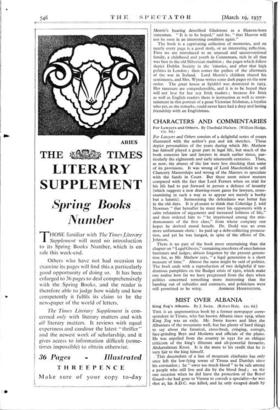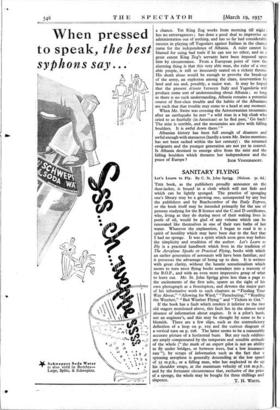MIST OVER ALBANIA • King Zog's Albania. By J. Swire.
(Robert Hale. 12.s. 6d.) THIS is an unpretentious book by a former newspaper corre- spondent in Tirana, who has known Albania since 1924, when King. Zog was an exile. Mi. Swire knows and likes, the Albanians of the mountains well, but has plenty of hard thingi to say about the fanatical, cross-bred, cringing, corrupt, face-grinding Beys and Moslems and officials of the plains: He was expelled from the country in 1931 for an oblique criticism of the king's illiterate and all-powerful: favourite, Abdurrahman Krosi. It is the more to his credit that .he is very fair to the king himself.
, This descendant of a line of mountain chieftains bas. only once left the low-lying towns of Tirana and Dunhes Since his coronation ; he "owes too much blood " to be safe among a people who still live and die by the blood feud ; on the one occasion when he did leave the protection of the Royal Guard—he had gone to Vienna to consult a specialist—he was shot at, his A.D.C. as 'cll. aid he, 91113, escaped death by
a chance. Yet King Zog works from morning till night ; has no extravagances ; has done a good deal to improvise an administration out of nothing, and has so far had considerable success in playing off Yugoslays against Italians in the chancy game for the independence of Albania. A ruler cannot be blamed for using bad tools if he can use no other, and to a great extent King Zog's servants have been imposed upon him by circumstance. From a European point of view the alarming thing is that this very able man, the ruler of a very able people, is still so insecurely seated on a rickety throne. His death alone would be enough to provoke the break-up of the army, an explosion among the clans, intervention by land and sea and, possibly, a major war. It may be hoped that the present detente between Italy and Yugoslavia will produce some sort of understanding about Albania ; so long as there is no such understanding, Albania remains a potential source of first-class trouble and the habits of the Albanians are such that that trouble may come to a head at any moment.
When Mr. Swire was crossing the Acroceraunian mountains after an earthquake he met "a wild man in a big cloak who cried to us fearfully (in American) as he fled past,' Go back! The mist is terrible, and the mountains are alive with falling boulders. It is awful down there.'" Albanian history has been full enough of disasters and awful enough with massacres (hardly a town Mr. Swire mentions has not been sacked within the last century) ; the returned emigrants and the younger generation are not yet in control. Is Albania destined to emerge alive from the mist and the falling boulders which threaten her independence and the





































































 Previous page
Previous page